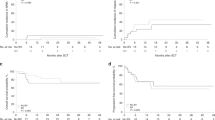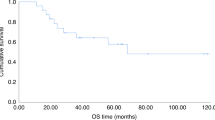Summary:
We retrospectively analyzed the outcome of 67 patients with breast (n=24), ovarian (n=11) or testicular cancer (n=32) treated for relapse after high-dose chemotherapy (HDC) and peripheral blood stem cell (PBSC) transplantation. Treatment, survival and toxicity were analyzed. Patients with breast, ovarian or testicular cancer received a mean of 5.9 (range 1–24), 5.1 (1–13) and 4.6 (1–13) regimens for relapse after HDC. Overall response at the end of the observation period was 20.8% for patients with breast cancer (three complete (CR) and two partial responses (PR)), 45.5% (one CR, four PR) for ovarian and 9.4% (three PR) for testicular cancer patients. The mean overall-survival (OAS) from first relapse was 28 (range 3–44), 17 (2–24) and 10 (1–28) months, respectively. Leukocytopenia grade 3/4 occurred in 27–63% of patients, and thrombocytopenia grade 3/4 was observed in 58–88%, respectively. Nonhematological grade 3/4 toxicities were below 20%. In conclusion, patients with relapse after HDC usually have a poor outcome but long-term survivors are observed. Hematological toxicity is common, while other severe side effects are less frequent.
This is a preview of subscription content, access via your institution
Access options
Subscribe to this journal
Receive 12 print issues and online access
$259.00 per year
only $21.58 per issue
Buy this article
- Purchase on Springer Link
- Instant access to full article PDF
Prices may be subject to local taxes which are calculated during checkout


Similar content being viewed by others
References
Gratwohl A, Passweg J, Baldomero H, Urbano-Ispizua A for the European Group for Blood and Marrow Transplantation. Hematopoietic stem cell transplantation activity in Europe in 1999. Bone Marrow Transplant. 2001; 27: 899–916.
Stadtmauer EA, O'Neill A, Goldstein LJ et al. Conventional-dose chemotherapy compared with high-dose chemotherapy plus autologous hematopoietic stem-cell transplantation for metastatic breast cancer. N Engl J Med 2000; 342: 1069–1076.
Peters W, Rosner G, Vredenburgh J et al. A prospective randomized comparison of two doses of combination alkylating agents as consolidation after CAF in high-risk primary breast cancer involving ten or more axillary lymph nodes: preliminary results of CALGB 9082/SWOG 9114/NCIC MA-13. Proc Am Soc Clin Oncol 1999; 18: 1a (abstract).
Schrama JG, Faneyte IF, Schornagel JH et al. Randomized trial of high-dose chemotherapy and hematopoietic progenitor-cell support in operable breast cancer with extensive lymph node involvement: final analysis with 7 years of follow-up. Ann Oncol 2002; 13: 689–698.
Bojko P, Scharifi M, Stössel K, Seeber S: Comparison of processing four and five times the patients’ blood volume during peripheral blood stem cell collection and analysis of CD34+38− and CD34+49d+ subsets during apheresis. J Cancer Res Clin Oncol 2002; 128: 19–28.
Peters WP, Ross M, Vredenburgh JV et al. High-dose chemotherapy and autologous bone marrow support as consolidation after standard-dose adjuvant therapy for high-risk primary breast cancer. J Clin Oncol 1993; 11: 1132–1143.
Peters WP, Dansey RD, Klein JL, Baynes RD . High-dose chemotherapy and peripheral blood progenitor cell transplantation in the treatment of breast cancer. Oncologist 2000; 5: 1–13.
Bergh J, Wiklund T, Erikstein B et al. Tailored fluorouracil, epirubicin, and cyclophosphamide compared with marrow-supported high-dose chemotherapy as adjuvant treatment for high-risk breast cancer: a randomised trial. Scandinavian Breast Group 9401 study. Lancet 2000; 356: 1384–1391.
Berry DA, Broadwater G, Klein JP et al. High-dose versus standard chemotherapy in metastatic breast cancer: comparison of Cancer and Leukemia Group B trials with data from the Autologous Blood and Marrow Transplant Registry. J Clin Oncol 2002; 20: 743–750.
Legros M, Dauplat J, Fleury J et al. High-dose chemotherapy with hematopoietic rescue in patients with stage III to IV ovarian cancer: long-term results. J Clin Oncol 1997; 15: 1302–1308.
Stiff PJ, Bayer R, Kerger C et al. High-dose chemotherapy with autologous transplantation for persistent/relapsed ovarian cancer: a multivariate analysis of survival for 100 consecutively treated patients. J Clin Oncol 1997; 15: 1309–1317.
Bokemeyer C, Kollmannsberger C, Meisner C et al. First-line high-dose chemotherapy compared with standard-dose PEB/VIP chemotherapy in patients with advanced germ cell tumors: a multivariate and matched-pair analysis. J Clin Oncol 1999; 17: 3450–3456.
Bhatia S, Abonour R, Porcu P et al. High-dose chemotherapy as initial salvage chemotherapy in patients with relapsed testicular cancer. J Clin Oncol 2000; 18: 3346–3351.
Waselenko JK, Caton J, Atkins MY et al. Salvage chemo-therapy significantly prolongs survival in patients with breast cancer who relapse after high-dose chemotherapy. Blood 1999; 94: 353a (abstract).
Cook S, Penson R, Duska L et al. Efficacy and hematologic toxicity of salvage chemotherapy following stem cell-supported high-dose chemotherapy in women with recurrent ovarian cancer. Gynecol Oncol 2000; 77: 48–54.
Kollmannsberger C, Schleucher N, Rick O et al. Outcome of patients with ‘poor prognosis’ germ cell cancer relapsing after primary high-dose chemotherapy plus stem cell support (pHD-CT/PBSCT). Proc Am Soc Clin Oncol 2002; 21: 199a (abstract).
Bokemeyer C, Gerl A, Schöffski P et al. Gemcitabine in patients with relapsed or cisplatin-refractory testicular cancer. J Clin Oncol 1999; 17: 512–516.
Kollmannsberger C, Rick O, Derigs HG et al. Activity of oxaliplatin in patients with relapsed or cisplatin-refractory germ cell cancer: a study of the German Testicular Cancer Study Group. J Clin Oncol 2002; 20: 2031–2037.
Hortobagyi GN . Treatment of breast cancer. N Engl J Med 1998; 339: 974–984.
Nieboer P, de Vries EG, Mulder NH et al. Long-term haematological recovery following high-dose chemotherapy with autologous bone marrow transplantation or peripheral stem cell transplantation in patients with solid tumours. Bone Marrow Transplant 2001; 27: 959–966.
Author information
Authors and Affiliations
Rights and permissions
About this article
Cite this article
Bojko, P., Akca, A. & Seeber, S. Outcome of 67 patients with solid tumors relapsed after high-dose chemotherapy and peripheral blood stem cell transplantation. Bone Marrow Transplant 31, 995–1000 (2003). https://doi.org/10.1038/sj.bmt.1704047
Received:
Accepted:
Published:
Issue Date:
DOI: https://doi.org/10.1038/sj.bmt.1704047
Keywords
This article is cited by
-
High-dose chemotherapy with autologous stem cell transplantation in patients with oligometastatic breast cancer
Bone Marrow Transplantation (2004)



